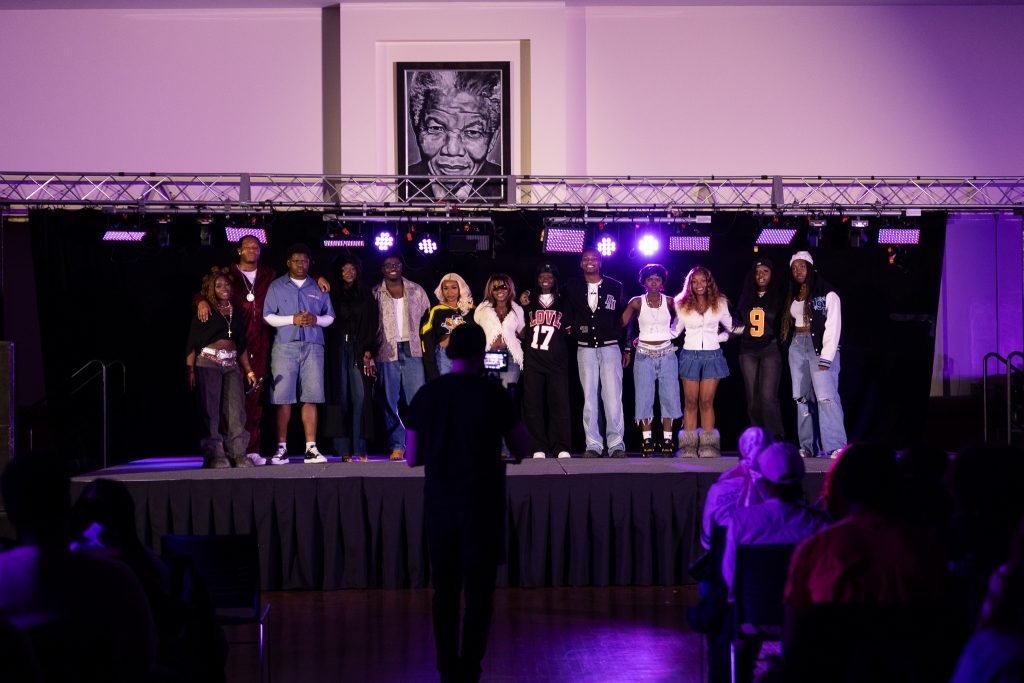The African Student Organization held its annual Culture Shock show this Saturday. Powered by lively dance groups, food and music, Culture Shock aimed to foster awareness and appreciation of African culture.
The Mandela Room was illuminated by colorful lights on the main stage and was transformed by fairy lights in the shape of the African continent. A full food and beverage table and pictures of the dance troupes and ASO’s E-Board were hung on the surrounding walls to decorate the space.
Jadesola Teriba, ASO’s president and a senior double-majoring in psychology and philosophy, politics and law, described the organization’s mission of celebrating African culture and heritage.
“As an organization dedicated to educating the campus community about the African Diaspora — exploring its social, cultural, and political dimensions — we are committed to celebrating and advancing our heritage,” Teriba wrote. “ASO tirelessly champions multiculturalism and African unity, driven by profound respect and deep admiration for our motherland. This event is just one of the many ways we showcase the multiculturalism of the African Diaspora.”
The theme, “Old School vs. New School,” was chosen to bring a nostalgic lens to the event while encouraging people to reflect on their own pasts. To reflect this, some troupes dressed in popular ’90s clothing and incorporated breakdancing into their routines.
Dance groups hailed all the way from SUNY Plattsburgh and SUNY New Paltz to compete with BU’s troupes. Similarly, while Culture Shock aims to highlight African dance, it prides itself on inclusion, seen through a performance from Quimbamba, a group established in 1970 to perform at the Latin American Student Union’s annual banquet that became independently chartered in 2013.
Culture Shock followed a knockout format, where judges would vote on which groups continued on. The event was created as a multidimensional arts showcase and has recently transformed into a dance competition.
The top three winners are celebrated, with the first-place team earning a $500 prize. And this year, there was a twist — attendees could also participate in the voting and decide which group would continue in the competition. From jailbreaks to classrooms, dances incorporated themes and plotlines to bring the audience along throughout the evening.
Each dance incorporated teamwork and skill to combine each dancer’s skills into a larger piece. Some performers backflipped on stage while others built human pyramids. With each new trick, the crowd exploded in applause for friends and strangers alike.
ASO’s vast network was displayed in their coordination with nearby SUNY schools and their regional dance troupes, bringing a diverse direction to the event. Fatoumata Barry, ASO’s activities coordinator and a sophomore double-majoring in Africana studies and philosophy, politics and law, shared the importance of representing a diverse array of African dances.
“What makes this event unique, however, is our recognition that African dance transcends the African continent and thrives in various regions of the African Diaspora,” Barry wrote. “This perspective enriches the celebration of African dance and highlights its global influence and diversity.”
Black Dance Repertoire, Quimbamba, Spicy Island Tings, MajorNoir, Collision and N’Fusion were the six dance troupes competing. Each featured hip-hop as a major part of their routines while also incorporating other dance styles like lyrical and bachata. Troupes also used modern and older pop songs which excited the crowd into singing along.
Two groups, SUNY Plattsburgh’s Spicy Island Tingz and SUNY New Paltz’s N’Fusion, were additions that many attendees loved. Incorporating the perspectives of other campuses created an encouraging environment that allowed dancers to share different talents and new ideas.
After the elimination rounds, the winners were finally announced. Spicy Island Tings placed first, with N’Fusion winning second and Black Dance Repertoire scoring third. The energy was supportive for all troupes —after the winners were announced, the teams congratulated one another.
“By providing artists an opportunity to showcase their craft and embody the organization’s mission of exploring social, cultural, and political dimensions of the African Diaspora, Culture Shock goes beyond a typical talent competition,” Teriba wrote. “It represents a strategic celebration of creativity, multiculturalism, and artistic expression that educates the campus community and honors the rich, diverse talents of its participants. The most rewarding aspect of Culture Shock is witnessing the collective effort of our entire team come to life — from my executive board’s strategic planning to our interns’ first experience managing a large-scale event, and especially the dance teams who poured their passion and dedication into perfecting performances they would ultimately showcase on stage.”



